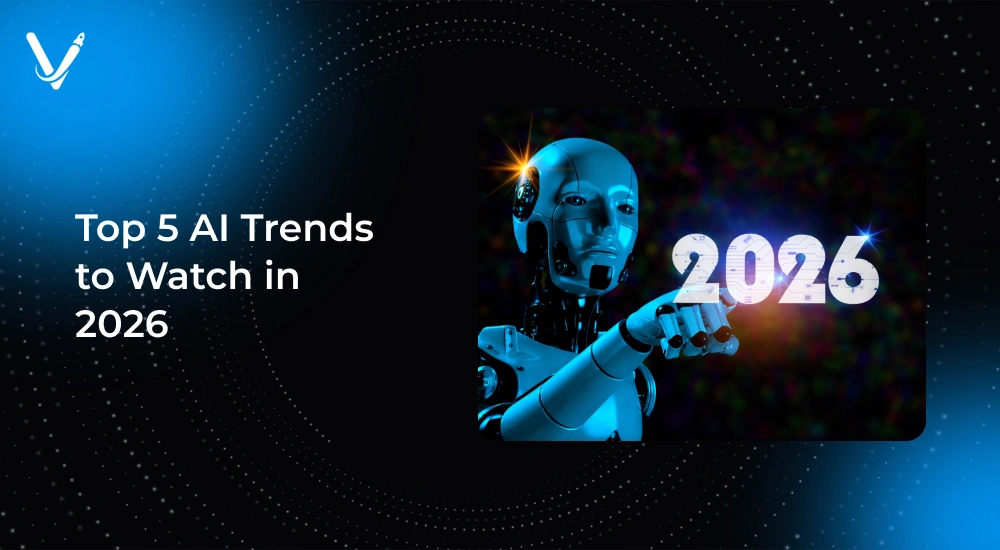Artificial Intelligence (AI) has quickly evolved from a futuristic concept to a transformative force across industries. The pace at which AI technologies are advancing is nothing short of extraordinary, and as we step into 2025, it’s clear that the landscape will look very different from where we are today. With AI becoming more ingrained in our daily lives and business operations, it’s essential to stay ahead of the curve to understand the trends that will shape the future of technology.
In this blog, we will dive into the top five AI trends to watch in 2025, providing insights into their potential impact and how organizations can leverage these innovations for competitive advantage.
Top 5 AI Trends to Watch in 2026
As we move into 2025, AI will continue to evolve and reshape various industries, unlocking new opportunities for businesses and consumers alike. From generative AI to AI-driven automation, here are the top five artificial intelligence trends to watch in the coming year:
1. Generative AI Will Redefine Content Creation
Generative AI refers to AI models capable of creating new content—whether text, images, music, or even video—based on training data. Models like OpenAI's GPT-4, Google's Bard, and DALL·E have already begun to show the capabilities of generative AI in various sectors.
By 2026, these technologies will be even more advanced, offering more realistic and creative outputs.
Key Trends:
- In the marketing and media industries, AI solutions will be used to automatically generate blog posts, advertisements, social media content, and even video scripts. With more personalized and engaging content becoming crucial for brands, generative AI tools will allow businesses to scale their content creation and outreach while maintaining a high degree of customization.
- Music, fashion, and game design are all industries that are primed for generative AI. Designers will use AI to create new clothing patterns, generate realistic game environments, or even compose music in different styles. AI-powered creative tools will allow professionals to brainstorm and develop ideas more rapidly, reducing time to market.
- Automated news writing is nothing new, but with 2025’s advancements, AI will not only write articles based on data but also generate investigative reports by cross-referencing numerous sources. This could significantly reduce the workload of journalists and enable them to focus more on analysis and creativity.
Impact on Businesses:
Companies that incorporate generative AI into their workflows will see significant improvements in productivity. AI-generated content will help companies save time and money, especially in marketing and creative processes, while still maintaining a high level of originality and relevance.
Also read: How To Integrate AI Into An App
2. AI for Personalization and Hyper-Personalized Customer Experiences
As AI solutions becomes more sophisticated, it will empower businesses to provide hyper-personalized experiences at an unprecedented scale.
Personalization in marketing and customer experience is not new, but the use of AI algorithms to understand customer preferences and behaviors will allow for even deeper, more intuitive personalization.
Key Trends:
- By 2026, AI will enable businesses to move beyond simple demographic-based segmentation and develop hyper-targeted marketing strategies. AI models will analyze vast amounts of data to create individual customer profiles, predicting their behaviors and needs in real time.
- Retailers will increasingly use AI to offer tailored recommendations based on a customer’s browsing history, past purchases, and even real-time contextual data. AI will also power virtual shopping assistants that can guide customers to products, answer queries, and even help with decision-making.
- The role of AI in customer service will expand beyond chatbots. In 2026, AI-powered customer service systems will provide personalized, context-aware assistance across multiple touchpoints. Whether through live chat, voice assistants, or email, AI will enhance the customer experience by providing faster, more relevant responses.
- AI systems will be able to recognize and respond to customers’ emotions in real-time. For example, by analyzing facial expressions, voice tone, or text sentiment, businesses can tailor their responses to create more empathetic and engaging interactions.
Impact on Businesses:
Businesses that embrace AI solutions for hyper-personalization will see an improvement in customer satisfaction, engagement, and retention. Companies will be able to build stronger relationships with their customers by offering unique, tailored experiences that feel more authentic and relevant.
Also read: Top Ways To Improve UX Design With AI
3. AI-Powered Automation Across Industries
The automation revolution has already begun, but in 2026, it will reach new heights. AI-powered automation will extend far beyond simple tasks like data entry and email responses.
The integration of AI across industries will automate entire workflows and decision-making processes, transforming how organizations operate.
Key Trends:
- AI will continue to revolutionize the manufacturing sector by automating complex tasks like quality control, predictive maintenance, and supply chain optimization. AI systems will monitor machinery in real-time, identifying potential issues before they become major problems, reducing downtime, and improving overall productivity.
- By 2026, AI will play a pivotal role in optimizing global supply chains. Through predictive analytics, AI will help businesses forecast demand, optimize inventory, and identify the most efficient shipping routes. Automation will ensure smoother logistics and faster delivery times.
- Healthcare organizations will automate more administrative tasks, such as medical billing, patient data management, and appointment scheduling. AI will also be used to automate diagnostic processes, such as analyzing medical imaging or identifying health risks based on patient data.
- RPA, when combined with AI, will allow businesses to automate more complex decision-making processes. AI-driven RPA will be used in sectors like finance, legal, and insurance to automate repetitive tasks and improve efficiency.
Impact on Businesses:
Organizations that integrate AI-driven automation will see significant cost savings and operational efficiencies. Automation will not only reduce human error but also free up valuable employee time to focus on higher-level tasks, leading to increased productivity and innovation.
4. Ethical AI and Responsible AI Governance
As AI becomes more integrated into society, the ethical implications of its use have come to the forefront. Issues such as bias in algorithms, data privacy, and AI’s potential impact on jobs have sparked widespread concern.
By 2026, businesses and governments will be under increasing pressure to ensure that AI is developed and deployed in a responsible and ethical manner.
Key Trends:
- One of the biggest ethical challenges in AI is the “black box” problem, where AI models operate in ways that are not fully understood by humans. In 2025, there will be greater emphasis on making AI systems more transparent and explainable. Organizations will be required to explain how AI models make decisions, especially in critical sectors like healthcare, finance, and criminal justice.
- AI will be used to tackle some of the world’s most pressing problems, such as climate change, poverty, and global health issues. Organizations will invest in AI for social good, focusing on using AI technologies to address challenges that affect society as a whole.
- As AI continues to advance, governments will create more robust regulatory frameworks to ensure responsible AI development. These regulations will focus on ensuring fairness, accountability, and transparency in AI systems, particularly in high-risk applications such as autonomous vehicles and surveillance.
- AI developers and organizations will prioritize fairness and inclusivity in AI models. Ensuring that AI systems do not perpetuate or exacerbate bias will be crucial, and by 2025, AI systems will be tested rigorously for bias and discrimination before being deployed in sensitive areas like hiring, lending, and law enforcement.
Impact on Businesses:
Adopting ethical AI practices will become a competitive advantage for businesses. Consumers are becoming more concerned with data privacy and fairness in AI, so businesses that prioritize transparency and ethical AI will earn the trust of their customers and avoid the risks associated with unethical AI practices.
Also read: Role of Generative AI in Digital Transformation
5. AI-Driven Cybersecurity and Fraud Prevention
Cybersecurity threats continue to evolve, and traditional methods of defending against them are no longer sufficient.
In 2026, AI will be integral in the fight against cybercrime, with AI systems becoming capable of detecting threats in real-time and responding to incidents before they escalate.
Key Trends:
- AI for Threat Detection and Response: AI will be used to detect cyber threats much faster and more accurately than human analysts. Machine learning algorithms will continuously analyze network traffic and user behavior to identify patterns indicative of a cyber attack. AI will also be used to automate incident response, mitigating threats in real time.
- AI-Powered Fraud Detection: In industries like banking and e-commerce, AI will be used to detect fraudulent transactions by analyzing vast amounts of data in real time. AI systems will be able to spot unusual patterns and behaviors, preventing fraud before it happens.
- AI in Identity and Access Management: By 2026, AI-powered biometric authentication will become commonplace. AI will enable more sophisticated and secure identity verification methods, such as facial recognition, voice recognition, and even behavioral biometrics, ensuring that only authorized users gain access to sensitive information.
- Proactive AI in Cyber Defense: Rather than simply reacting to cyber threats, AI will help organizations predict and prevent attacks before they occur. By analyzing data from various sources, AI will generate insights that enable organizations to take proactive measures to strengthen their defenses.
Impact on Businesses:
AI-driven cybersecurity will be essential for protecting businesses from evolving threats. Organizations that invest in AI-powered security systems will reduce the risk of data breaches
and fraud, ensuring their customers' trust and safeguarding their digital assets.
Conclusion
As we approach 2026, it’s evident that AI will continue to revolutionize the way businesses operate, create value, and interact with customers. From generative AI transforming content creation to AI-powered automation reshaping entire industries, the opportunities for innovation are vast. However, as AI becomes increasingly embedded in our daily lives, it’s crucial for businesses to collaborate with AI development company or product consulting company like Vasundhara Infotech and remain aware of the ethical implications.
By staying ahead of these top 5 artificial intelligence trends, organizations can harness the power of artificial intelligence to drive growth, improve customer experiences, and create a competitive advantage in an increasingly AI-driven world. Contact our expert team to know more about AI trends.


